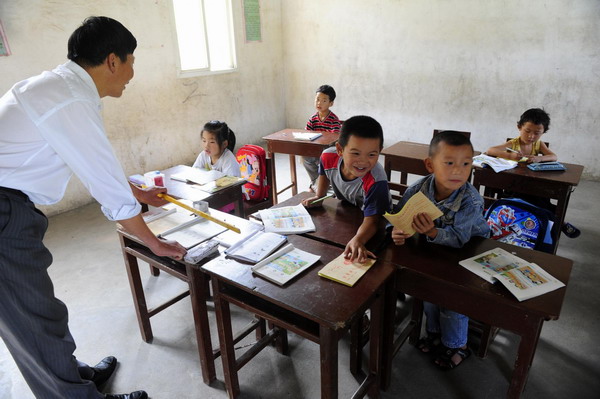China vows greater investment in rural teachers
 0 Comment(s)
0 Comment(s) Print
Print E-mail
Xinhua, September 7, 2011
E-mail
Xinhua, September 7, 2011
The Ministry of Education said on Tuesday that greater efforts will be made to improve the quality of rural teachers in a bid to ensure fair education for all.
 |
|
A teacher gives lesson to five pupils at a primary school in Liujiashan village of 400 people in Caidian township, Wuhan, capital city of Central China's Hubei province, Sep 2, 2011. Located on the top of the 800m Liujia Hill in one of the most remote regions in Wuhan, the primary school has survived the harshest conditions with support from the villagers who wish their children are able to attend school locally instead of travelling over 15 kilometers.[File photo] |
Xu Tao, director of the division in charge of teaching staff, said at a press conference that more investment will be poured into training programs especially designed for rural teachers.
"About 5.5 million rural teachers in relatively backward central and western areas will receive national training in five years as the first step in our plan," Xu said.
Secondly, he said, the pilot program that offers state-funded undergraduate study for future teachers in six of China's elite normal universities will be further extended nationwide.
Initiated in 2007, the pilot program allows six normal universities in the cities of Beijing, Shanghai, Changchun, Wuhan, Xi'an and Chongqing to provide tuition waiver for 12,000 students annually.
To be eligible for the tuition waiver, students are required to work at primary or middle schools in their hometowns for at least 10 years after graduating. The students must also spend their first two years in a rural school, as many of China's rural schools do not have enough qualified teachers.
The six universities have provided free education to 46,000 students over the last four years. Ninety percent of this year's graduates will work in underdeveloped areas in central and western China, according to the ministry.
As the third key measure, more college graduates will be recruited to teach in rural areas, Xu said.
To enlarge the source of rural teachers, China kicked off a program that recruits college graduates to teach for three years in rural areas in 2006. So far, around 250,000 graduates have taken jobs and taught in over 30,000 rural schools.
"We will further expand the program by increasing subsidies to college graduates who join the program," Xu said.
Xu also called for greater exchanges between rural and urban teachers and for efforts to get more urban teachers to teach in rural areas on a regular basis.
Since 2006, 18 provincial regions have filled more than 5,000 rural teaching positions with urban teachers.
Further, the central government will channel 50 billion yuan (7.7 billion U.S. dollars) to support pre-school education in underdeveloped areas.
"With funds allocated by the central government, we will complete the training for 300,000 rural pre-school teachers within five years," Xu said.





